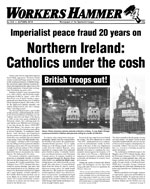
Quote of the issue Imperialism: system of war and plunder The world is beset with wars and economic depredations. The US as well as Britain and the other European imperialist powers have laid waste to vast expanses of the Near East. More powerful countries economically strangle the weaker ones, as Germany has done to Greece via the instrument of the EU. Meanwhile, the increased tensions and incipient trade wars between the imperialist powers point to the ever present danger of a third interimperialist World War. In 1936 then-Trotskyist James Burnham, writing under the pseudonym John West, explained that war is inherent to the imperialist system. The truth of the matter is this: In the stage of imperialism, capitalist society is continuously at war. This is of the essence of imperialism. It is not a question of one war starting, then stopping, to be followed in a decade or two by a new war. It is war all the time, changing only in the form it takes, in the degree of violence. Conflict at the “economic level” continues without interruption: economic struggles for sources of raw material, for new markets, for new fields of exploitation; tariff and exchange battles; competition for shipping and loans; exploration to discover new mines, oil wells, land for rubber and coffee and cotton plantations; and all the rest. But the conflict can never remain at the purely economic level. The stakes are too high — failure at the economic level means the destruction of the defeated economic group. Therefore, the finance-capitalists must utilize constantly their political servants — the governments of their respective countries. And the governments are not slow to answer. They build up their military and naval armaments to almost unbelievable heights. They are ever ready to unseat a Central American government, threaten a native prince, wipe out “red bandits”, stop or start a revolution, send a flotilla of warships or a regiment of marines, resent an “insult to the flag”, if necessary set two countries — Bolivia and Paraguay, for example — flying at each other’s throats to settle the dispute of Standard Oil and Shell over rights to an oil field. At the beck and call of finance-capital, the government, with the guns and cruisers and airplanes, snaps quickly to attention. That, indeed, is what the governments are for. The economic conflicts and “minor wars” of capital expansion, of tariff and exchange and armament and competitive exploitation, reach a point where the attempt is made to find a political solution of the economic and social contradictions through war, open and undisguised: imperialist-inspired wars between subject nations; wars of subjugation by imperialist nations against subject peoples; and, finally, the world-wide war of the imperialist nations among themselves, fighting for the re-division of the world. But, though producing a temporary “boom” by loosening the bonds on capital expansion, by the destruction of existing capital values and by credit expansion, the open wars, far from solving the conflicts, only express their depth, and prepare for still more bitter conflict to come.... The moral, religious, racial and ideological disguises that war wears must not be allowed to hide the fundamental conflicts which are the true source of modern war. The general conclusion is inescapable: Modern war is neither accidental nor due to the evil of human nature nor decreed by God. War is of the very essence of imperialist-capitalism, as much a part of capitalism as wage labor. To speak of capitalism without war is like speaking of a human being without lungs. The fate of one is inextricably bound to the fate of the other. — John West (James Burnham), War and the workers (1936)
|
|
||||||||||||||||||||||||||||||||||||||||||||||||
